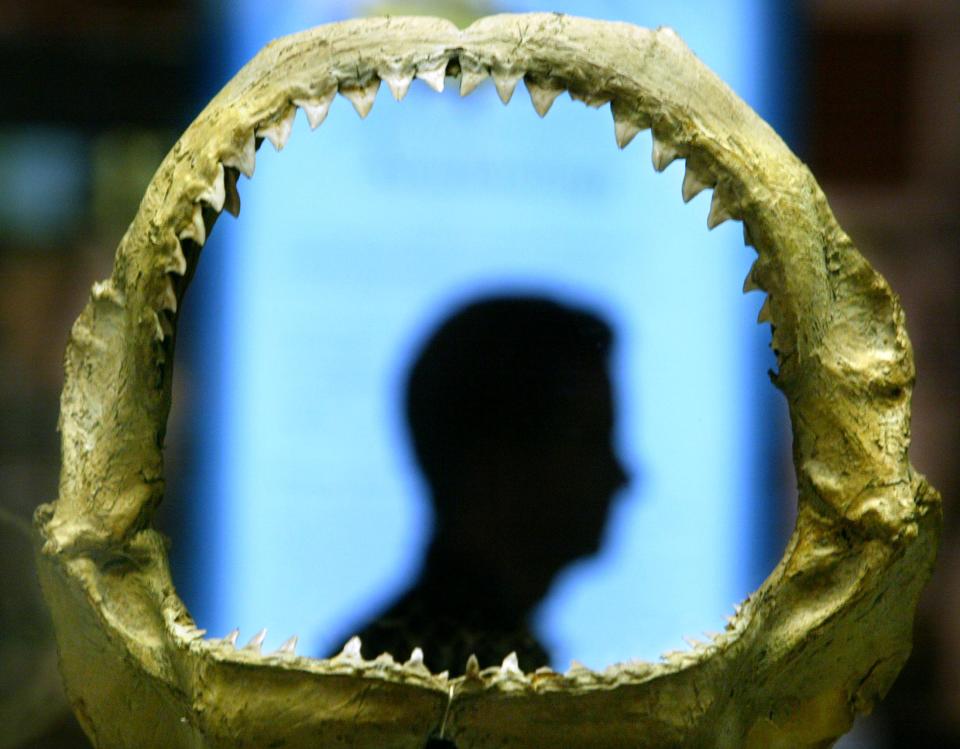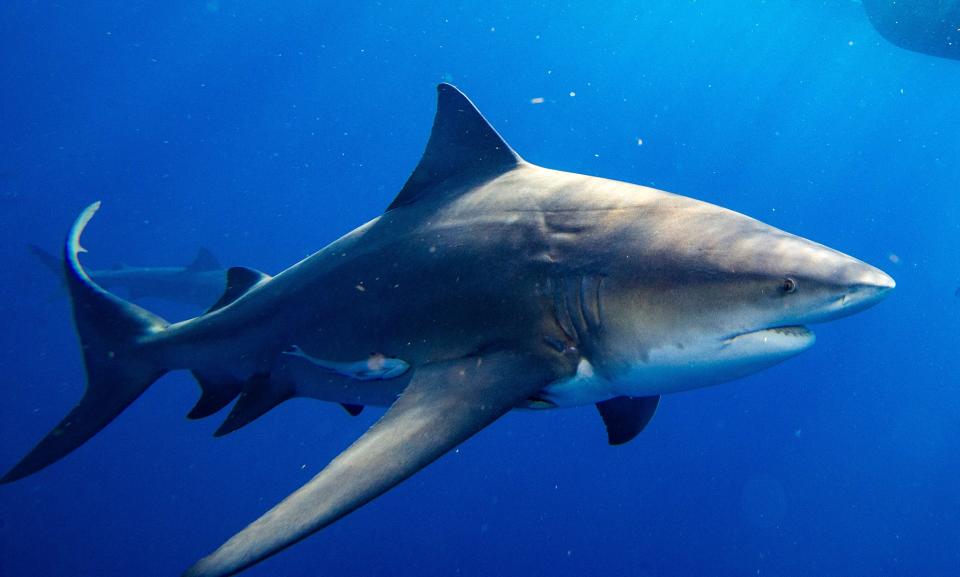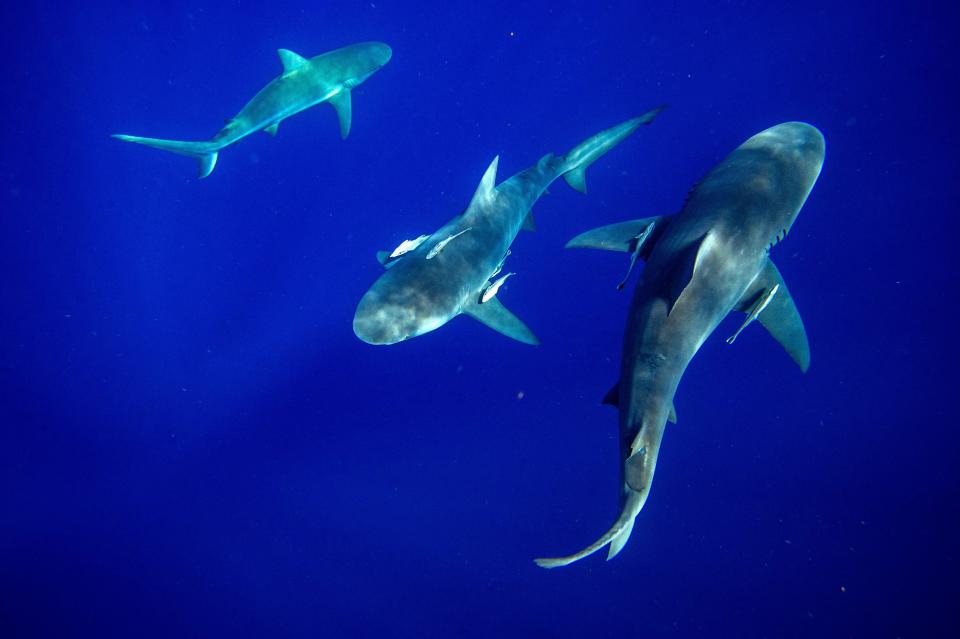A shark in the Great Lakes isn't quite impossible. One odd species got as far as Illinois.
You may have seen the touristy T-shirts that declare it: "The Great Lakes: Unsalted and Shark-Free."
That's absolutely true. There is no verifiable account of sharks ever reaching the Great Lakes, and multiple hoaxes have been exposed and urban legends debunked over the years.
A Great Lakes shark is virtually impossible. But not quite.
One particular shark has a pronounced ability to switch from salty ocean water to fresh water as necessary: the bull shark.

Bull sharks can grow up to 11 feet long and weigh up to 700 pounds. The species has been implicated in the third-most attacks on humans globally, trailing only Great White and Tiger sharks, according to the International Shark Attack File, a scientifically vetted, global database kept by the University of Florida's Florida Museum since 1958.
Most freshwater fish species can't survive in ocean water, nor ocean fish in fresh water, because of their inability to regulate salts in their body as they switch from one environment to the other. Some species of sharks, rays and other fish can switch for short periods of time. But bull sharks have a unique ability with their kidneys, liver, gills and rectal gland to not only have tremendous variation in the amount of salt and wastes they excrete, but in the dilution of those wastes. It allows them to regulate their body's salt levels to where they need to be to survive in ocean or freshwater.
Is the 1937 story of a shark caught in Illinois true?
"If you look at the physiology of a bull shark, they are more than capable" of living in a freshwater environment like the Great Lakes, said Phil Willink, a fisheries biologist with the Illinois Natural History Survey, a research branch of the University of Illinois. Willink, who received a doctorate in biology from the University of Michigan, has previously served as a biologist with Chicago's famous Field Museum of Natural History and Shedd Aquarium.
"Bull sharks are pretty good at swimming up freshwater."
Fishermen more than occasionally catch juvenile bull sharks in the Mississippi River, though usually near its outlet into the Gulf of Mexico. But there's one extraordinary find of a bull shark on the Mississippi from 1937 in Alton, Illinois, north of St. Louis — less than 250 miles from southern Lake Michigan — that shows the hardy shark's northbound, freshwater capabilities.
As the story goes, local commercial fishermen Herbert Cope and Dudge Collins were finding some sort of predator fish raiding and damaging their wood and mesh fish traps, so they built a trap made of stronger wire and baited it with chicken guts. Expecting to catch a muskie or similar local predator fish, they instead caught a 5-foot, 85-pound bull shark.
The fishermen proudly displayed their catch for astonished locals, and researchers have confirmed from a photo taken at the time that the shark on display was indeed a bull shark.

But was it a hoax? Illinois DNR officials take no stand on the veracity of the 1937 Alton catch and said no confirmed bull shark find has happened in state waters in the nearly 90 years since.
The debate about whether the Alton bull shark was a fisherman's tale has raged since the first days of the catch, up to today. Robert Honke, the director of Alton Marina and the city's municipal harbor, is a skeptic.
"While it may be possible for (a bull shark) to make it up here, it probably didn’t really happen," he said.
One story in town is that the fishing buddies caught a bull shark on a fishing trip in Florida, "packed it up, brought it up here and scared the hell out of everybody — pranksters that got one over on everybody," Honke said.
But he acknowledged that there is no concrete evidence that version of events is true, either.
"I actually wish" the bull shark catch story "was true, because it's a fun, neat story," he said.
Most Great Lakes shark hoaxes came after 'Jaws'
One person who does believe it's true is Ryan Shell, a paleontologist with the U.S. Forest Service now based in Traverse City, who wrote a 2021 research paper on bull sharks traveling to the Upper Mississippi Basin that examined the Alton case.
"Of all of the super-inland bull shark occurrences, I would say Alton, Illinois, is the one where it is the least certain that it is a hoax," he said. "It's certainly possible, but it occurred very, very early. As you can imagine, most shark-in-freshwater hoaxes postdate 'Jaws' " — the 1974 Peter Benchley fiction novel of a Great White shark terrorizing the residents of Amity Island, New York, that director Steven Spielberg turned into the greatest-grossing movie of all time in the summer of 1975.
"It seems to me relatively unlikely that the Alton, Illinois, find is a hoax — because it's unlike most of the hoaxes that we see," Shell said. "It would have required people living in the hill country of southern Illinois to correctly catch the right bull shark and travel with it in a 1930s-era automobile on 1930s-era roads back from wherever they caught it, to stage this prank. Which is sounding just increasingly unlikely."
So bull sharks are capable of living in fresh water, and there's some evidence one made it as far as Illinois. But before you cancel those beach plans in South Haven, many obstacles remain in the way of one of these bulls ever charging into our Great Lakes.

One is temperature. As climate change warms waters and causes many fish species to shift their ranges northward, that same dynamic has been found with shark and ray species, including bull sharks. But the Great Lakes are still just too cold for too much of the year to be desirable habitat for the sharks, Willinks said.
"They are very tropical and subtropical. They like the warmer water," he said.
But the more significant, literal hurdle are the systems of locks and dams that have transformed the Mississippi, Illinois and other rivers since the early 20th century.
"With something as large as a shark, why would it bother doing it?" Willinks said.
So bull sharks in the Great Lakes haven't happened and could never happen. Could it?
"When it comes to bull sharks in more temperate places, I am willing to be surprised by them," Shell said.
Contact Keith Matheny: kmatheny@freepress.com.
This article originally appeared on Detroit Free Press: Sharks in the Great Lakes? No. But 1 odd species made it to Illinois.

